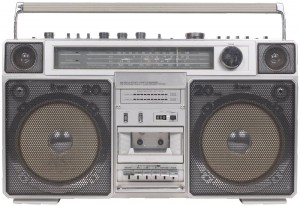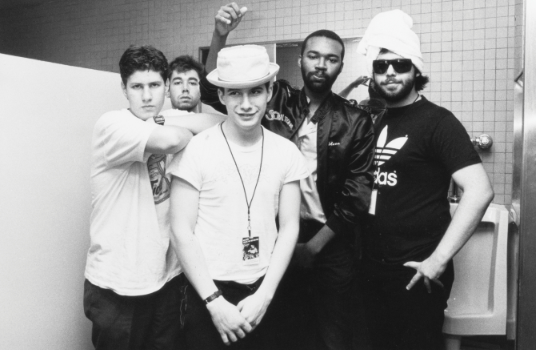
Gazelle MCI is a veteran urban music industry radio promoter who started out in the business as an indie label proprietor during the mid to later 1980s. Currently, he is the director of mixshow promotions at E1 Music (formally known as Koch Entertainment). Other duties provided by Gazelle include promoting videos to local video shows, as well as helping to coordinate promotional tours for the label’s urban artists.
In this Q&A, he explains the value and process of urban mixshow radio promotions today, and shares his views into this distinct and sometimes misunderstood aspect of music marketing. He also provides insight about the effectiveness and use of eblasts to build awareness for a release, and how these efforts correlate to the sale of music.
How did you get into the music business?
I wanted to be in the entertainment business and started to figure out how I was going to get in. At first I wanted to be a rapper but found myself more and more on the business side. As I did my research I found that I was better suited for the business side. I started recording, manufacturing, and distributing records (12 inch vinyl) in 1988 under my record label, MCI Entertainment Records. I was in high school with my own successful record label. Just an FYI, I was in high school with the Audio Two and Jarobi from Tribe Called Quest.
Can you explain your role at E1 in regards to promoting a release?
Hip hop records start with the mixshow. My job is to make sure every mixshow DJ in the country is aware of my new records. Once they are aware of the record it’s then my job to make sure every one of those DJs is playing my record.
Can you discuss some of the releases that you’ve worked?
My discography goes back to 1988 so I will just mention some of the big records and artists: Sean Paul’s “Gimme The Light,” Tanto Metro & Devonte’s “Everyone Falls In Love,” Baby Cham’s “Ghetto Story,” Jim Jones’s “We Fly High,”DJ Unk “Walk It Out” and the list goes on, and on, and on.
Why is mixshow radio important?
Mixshow is important because it’s the perfect way to expose an audience to new music. Most DJs are taught to sandwich new music between hits. Blending these records allows the audience to become familiar with new records.
Do you work with mixtape DJs as well?
I don’t work as closely with mixtape DJ’s as I would have in the past. Back in the day a mixtape DJ was equally as important as the mixshow DJ and the club DJ. Technology, which I consider the gift and the curse, has in my opinion devalued the strength of the mixtape DJ. Technology has made it all so easy that everyone is doing it; everyone can get the music for free on the Internet. There are no more gatekeepers. In the past, record labels and DJs were gatekeepers that steered the public to good music. Without the gatekeepers the public gets the good with the bad and they are desensitized.
How has the Internet changed the overall value of radio promotions?
It is now cheaper to get the music out. I can reach the world with a click of my mouse. That part is wonderful. But everyone has an email blast. When you send out a song you now compete with the good stuff out there and the bad stuff out there. Thank the Lord, promotions is all about relationships. Once I get my songs out via the Internet it’s back to old-fashioned phone calls and making that personal connections. I also use Twitter and email to help me get the job accomplished.
Do you just work music that is on the label or do you also provide promotions services to E1 Music distributed labels?
My position at E1 Music only requires me to work records by artists signed to the label. I believe that the distribution company offers label services to the labels they distribute, which means they offer help with radio and various forms of promotions but that is not part of my job duties.
How many mixshows do you service, and on how many stations?
I service over 1000 DJ’s around the country on more that 300 radio stations.
Can you explain the distinction between mixshow play and commercial radio rotation? Does a different department work daytime airplay?
Most rap and some R&B records start off in mixshow. Mixshow is when a DJ comes into the station and mixes records as opposed to the program director determining what’s being played on the station. Originally mixshows were only heard on weekends and they were basically to recreate the feel of the nightclub on the radio. Radio’s job is to keep you tuned in as long as possible. What radio was forced to discover in the early days of mixshow was that the most powerful and influential people in the music community weren’t the radio personalities but the club and street DJ’s. People were in the clubs and in the parks and these DJ’s were breaking records way before radio was aware of it. Radio then decided to hire some of these club and street DJs to work at the radio station doing mixshows, so that the radio station would seem hip and be able to better gauge which songs were becoming popular on the streets and in the clubs. Mixshow still basically serves the same purpose today. Mixshow DJs usually play new hot music first. As a record gains in popularity it moves to regular rotation.
Radio rotation happens when a record is deemed popular and familiar to the average listener. Some people complain that they hear the same 10-15 records all day on radio. Rotation radio is designed to give the wider mass of people the most popular songs they want to hear all day.
We have other people that work to get records into regular rotation on radio stations. Once a record has been on mixshow and playing in the clubs our radio staff goes to work on getting the record into regular rotation. They set an add date, which means they pick a day (always a Tuesday) and they try to get as many stations to put the record into the rotation at the same time. We have a hierarchy of people working on this. There are national and regional promoters working to make this happen.
What charts do you use to gauge effectiveness of a campaign?
We use the BDS and Mediabase charts to gauge the success of our work.
How relevant is college radio today?
In the early days, college radio was just as important as mixshow play. Ten years ago you could get college radio play alone and still sell a good amount of records. As the “stars” of college radio graduated or moved on, college radio lost some of its importance. College radio is starting to make a comeback now that they are being monitored by BDS.
When you send out music via an email blast, is this before that single is officially released for sale?
Most of the time, our email blast occur before the single is actually available for sale.
Is the single sent through an email blast meant specifically to be played on the radio, or is this just a tool to garner interest?
Both. I use it to get the word out about our new record and to get guys to play it.
Are you still sending out music via vinyl? If so, how has this changed in the last several years? In other words how much vinyl goes out now versus a decade ago?
We haven’t sent out vinyl in maybe 3 or 4 years. 10 years ago we would press 5000 pieces of vinyl for mixshow promotion. Last year we stopped sending CD singles. Once, the powers that be discovered that we were able to promote a song without sending a physical CD, it was a wrap for CD promotion.
Being that urban radio is a single based promotional activity, do you see a direct correlation between airtime on mixshows and single sales?
Mixshow and rotation definitely impact how well a single sells.
What’s your role and goal when you travel with an artist or recording act?
The goal when I’m out with an artist is to promote the song and artist as much as possible. We do college and commercial radio interviews, local video shows, local retail stores, clothing stores, or anywhere we can promote the artist, the record, and the upcoming album.


